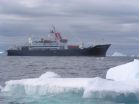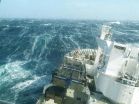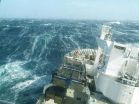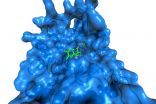Southern Ocean carbon sink has renewed strength
2015-09-10
(Press-News.org) This news release is available in Japanese.
The Southern Ocean has increased its uptake of atmospheric carbon dioxide again, after showing signs of slowing uptake in the 1990s, according to a new report from Peter Landschützer and colleagues. The Southern Ocean is a huge player in carbon sequestration, accounting for up to 40% of oceanic uptake of atmospheric carbon dioxide. When earlier studies showed the Southern Ocean's carbon sink weakening, the findings raised concerns that the planet might lose a powerful way to remove the growing amounts of carbon dioxide emitted by human activity that are driving global climate change. Although it is welcome news that the Southern Ocean can sop up more carbon dioxide than it seemed it would, the researchers say that the new findings also illustrate how variable the carbon sink can be over time. Landschützer and colleagues analyzed a global data set of the differences between atmospheric and ocean carbon dioxide concentrations that included 2.6 million observations from the Southern Ocean over the course of 30 years. Their analyses suggest that the Southern Ocean carbon sink was weaker than normal from the early 1980s until about 2002. After that, the sink began to grow stronger again due to a variety of factors, including differences in sea surface temperature and the amount of dissolved inorganic carbon, operating over several sectors of the Southern Ocean. S. E. Mikaloff Fletcher discusses the results in a related Perspective.
INFORMATION:
Article #11: "The reinvigoration of the Southern Ocean carbon sink," by P. Landschützer; N. Gruber; F.A. Haumann at ETH Zürich in Zürich, Switzerland; C. Rödenbeck at Max Planck Institute for Biogeochemistry in Jena, Germany; D.C.E. Bakker at University of East Anglia in Norwich, UK; S. van Heuven; M. Hoppema at Alfred Wegener Institute Helmholtz Centre for Polar and Marine Research in Bremerhaven, Germany; N. Metzl at Sorbonne Universités in Paris, France; N. Metzl at Université Pierre et Marie Curie - UMPC in Paris, France; N. Metzl at CNRS in Paris, France; C. Sweeney at National Oceanic and Atmospheric Administration (NOAA) Earth System Research Laboratory in Boulder, CO; T. Takahashi at Lamont-Doherty Earth Observatory of Columbia University in Palisades, NY; B. Tilbrook at Commonwealth Scientific and Industrial Research Organisation and Antarctic Climate and Ecosystems Cooperative Research Centre in Hobart, TAS, Australia; R. Wanninkhof at Atlantic Oceanographic and Meteorological Laboratory of NOAA in Miami, FL; S. van Heuven at Royal Netherlands Institute of Sea Research (NIOZ) in Texel, Netherlands.
Article #3: "An increasing carbon sink?" by S.E. Mikaloff Fletcher at National Institute of Water and Atmospheric Research (NIWA) in Wellington, New Zealand.
ELSE PRESS RELEASES FROM THIS DATE:
2015-09-10
Breathe in, breathe out, in, out... Like a giant lung, the Southern Ocean seasonally absorbs vast amounts of carbon dioxide (CO2) from the atmosphere and releases it back later in the year. But on an annual average the seas surrounding Antarctica absorb significantly more CO2 than they release. Most importantly, these seas remove a large part of the CO2 that human activities emit into the atmosphere, thereby slowing down the growth of this greenhouse gas in the atmosphere, lessening the rate of climate change. Although the Southern Ocean represents no more than a quarter ...
2015-09-10
Berkeley -- To speed up progress in tackling climate change, policymakers need to build political support by investing in clean-energy industries rather than first penalizing polluters, according to a new policy paper by researchers at the University of California, Berkeley.
In the paper, to be published Thursday, Sept. 10, in the journal Science, a multidisciplinary team of environmental, political and legal experts finds that instead of emphasizing cap-and-trade schemes and penalties on greenhouse gas emissions - strategies considered to be most efficient by many economists ...
2015-09-10
MENLO PARK, Calif. -- Some of the inner workings of Earth's subduction zones and their "megathrust" faults are revealed in a paper published today in the journal Science. U.S. Geological Survey scientist Jeanne Hardebeck calculated the frictional strength of subduction zone faults worldwide, and the stresses they are under. Stresses in subduction zones are found to be low, although the smaller amount of stress can still lead to a great earthquake.
Subduction zone megathrust faults produce most of the world's largest earthquakes. The stresses are the forces acting on ...
2015-09-10
Researchers from the MRC Centre for Developmental Neurobiology (MRC CDN) at the Institute of Psychiatry, Psychology & Neuroscience (IoPPN), King's College London, have discovered a new molecular 'switch' that controls the properties of neurons in response to changes in the activity of their neural network. The findings, published in Science, suggest that the 'hardware' in our brain is tuneable and could have implications that go far beyond basic neuroscience - from informing education policy to developing new therapies for neurological disorders such as epilepsy.
Computers ...
2015-09-10
WASHINGTON, D.C. - Since 2002, the Southern Ocean has been removing more of the greenhouse gas carbon dioxide from the atmosphere, according to two new studies.
These studies make use of millions of ship-based observations and a variety of data analysis techniques to conclude that that the Southern Ocean has increasingly taken up more carbon dioxide during the last 13 years. That follows a decade from the early 1990s to 2000s, where evidence suggested the Southern Ocean carbon dioxide sink was weakening. The new studies appear today in the American Geophysical Union ...
2015-09-10
A prospective longitudinal study of U.S. Marines suggests that reduced heart rate variability - the changing time interval between heartbeats - may be a contributing risk factor for post-traumatic stress disorder (PTSD). The findings are reported in the September 9 online issue of JAMA Psychiatry by researchers at the University of California, San Diego School of Medicine and Veterans Affairs San Diego Healthcare System.
Even at rest, the normal rhythm of the heart fluctuates, reflecting influences and changes in other parts of the body. Generally speaking, the greater ...
2015-09-10
Imagine the scientific discoveries that would result from a searchable online database containing millions of plant, algae, and fungi specimen records. Thanks to a new set of workflow modules to digitize specimen collections currently preserved in herbaria, something like that might be within reach. The modules are provided by the National Science Foundation's (NSF) Integrated Digitized Biocollections (iDigBio), which is facilitating a collective effort to unify digitization projects across the nation.
"North America's herbaria curate approximately 74 million specimens ...
2015-09-10
COLUMBUS, Ohio - Would a color by any other name be thought of in the same way, regardless of the language used to describe it?
According to new research, the answer is yes.
A new study examines how a culture of nomadic hunter-gatherers names colors, and shows that they group colors into categories that align with patterns of color grouping evident in 110 other world languages.
This study population - the Hadza people of Tanzania - has relatively few commonly shared color words in its language. During the study, the most common response by Hadza participants to a ...
2015-09-10
Seasonal flare-ups in patients with multiple sclerosis are caused by plummeting levels of melatonin in the spring and summer, according to research published September 10 in Cell. The study reveals that relapses in patients with this autoimmune disorder are much less frequent in the fall and winter, when levels of the so-called darkness hormone are at their highest, but the reverse is true in the spring and summer seasons.
Moreover, treatment with melatonin improved clinical symptoms in a mouse model of multiple sclerosis by restoring a healthy balance of immune cells ...
2015-09-10
The blame for some of chemotherapy's awful side effects may lie with our gut microbes, early evidence suggests. As chemotherapy drugs are eliminated from the body, bacteria in the gastrointestinal tract can latch onto them and transform them into toxic species that cause severe diarrhea. In a Chemistry & Biology article published online on September 10, researchers present ways to shut down the ability of GI microbes to convert chemotherapy drugs to a toxic species in mice as a first step to helping cancer patients.
"The GI microbiota are the great crowd-sourcers of chemistry, ...
LAST 30 PRESS RELEASES:
[Press-News.org] Southern Ocean carbon sink has renewed strength




